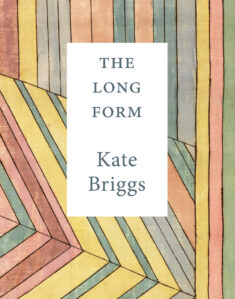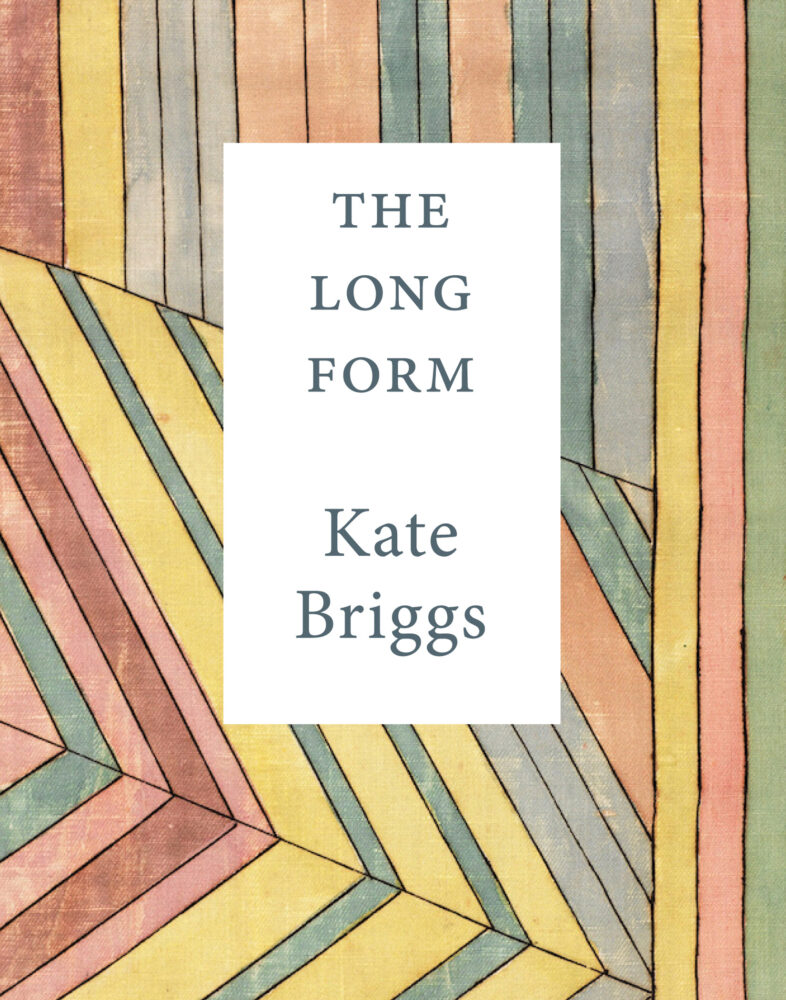
buy this book from our distributor NYRB
Kate Briggs grew up in Somerset, UK, and lives and works in Rotterdam, NL, where she founded and co-runs the writing and publishing project “Short Pieces That Move.” She is the translator of two volumes of Roland Barthes’s lecture and seminar notes at the Collège de France: The Preparation of the Novel and How to Live Together, both published by Columbia University Press. The Long Form follows This Little Art, a narrative essay on the practice of translation. In 2021, Kate Briggs was awarded a Windham-Campbell Prize.
The Long Form

buy this book from our distributor NYRB
“I finished The Long Form and started again from the beginning; I wanted to understand how this miracle of a book had come to be; I was not ready to let go.” Moyra Davey, The Paris Review
Shortlisted for the Goldsmiths Prize * Finalist for the Republic of Consciousness Prize * Boston Globe: Books we loved in 2023 * The Guardian: The best fiction of 2023 * OC Register: 25 must-read books from independent press in 2023 * The Paris Review‘s Favorite Books of 2023 * The New Yorker: Best Books of 2023
For news and events, please follow us on Twitter / Instagram.
In Kate Briggs’s The Long Form, Helen, a young mother, is awake with her baby. Together they move through a morning routine that is in one sense entirely ordinary—resting, feeding, pacing. Yet in the closeness of their rented flat, such everyday acts take on epic scope, thoughts and objects made newly alive in the light of their shared attention. Then the rhythm of their morning is interrupted: a delivery person arrives with a used copy of Fielding’s The History of Tom Jones, which Helen has ordered online. She begins to read, and attention shifts. As their day unfolds, the intimate space Helen shares with her baby becomes entwined with Fielding’s novel, with other books and ideas, and with questions about class and privilege, housing and caregiving, and the support structures that underlie durational forms of codependency, both social and artistic.
The story of two people composing a day together, The Long Form also renews Fielding’s proposition for what a novel can be: a province of writing that gathers both fiction and essay, that looks to past traditions while supporting new life.
*
Read Kate Briggs’s essay on writing The Long Form, “My Strawberry Plants: On Marcottage,” at The Paris Review.
*
“Reading Briggs, I felt the novel, as a genre, lift its head and look around the room, with all the effort, focus, and luminous curiosity of a newborn, seeing in a way it hadn’t seen before.” Audrey Wollen, The New Yorker
“[A]n utterly resplendent, luminous exploration of fiction’s possibilities. . . . let there be trumpets, heralding Briggs and the possibilities of this long form.” Jennifer Kabat, 4Columns
“I got the feeling . . . not of interrupting my life by reading it but understanding what it means to interrupt a book with a life. And in this sense the book comes to life in a way none other has for me — not a thing to be consumed but a force exerting its own energy on me.” Elisa Wouk Almino, Los Angeles Times
“[An] exquisite study of care and attention . . . [a] quietly radical masterpiece.” Maddie Mortimer, Judge, Goldsmiths Prize
“[A] quietly radical reinvention of the domestic novel in which a woman and her baby spend their day reading, thinking, feeding, napping — being. It’s full to the brim with fertile ideas about time, literature, care, and how we live within the form of our days.” Justine Jordan, The Guardian, “The best fiction of 2023”
“I was taken back again and again by the richness and empathy of Briggs’ writing.” Jack Rockwell, Chicago Review of Books
“Ostensibly about a single day in the lives of a new mother and her infant, The Long Form—with its recursive structure, its subtle connections and reverberations, its attentiveness to physical and social life, and its animated conversation with other works of fiction and theory—presents the novel form as the most elastic of containers. Kate Briggs is a brilliant writer and thinker.” Kathryn Scanlan
“Briggs’s balancing, or really blending, of the vividly realized narrative of the book with her searching intellectual work (and play) is a rare feat, one infused on every page with her characteristic warmth and energy.” Heather Green, On the Seawall
“This don’t-miss debut captures the details of early parenthood while engaging with ideas about time and caregiving.” Kirkus
“Briggs’s charming yet formidable debut novel merges the chronicle of a young mother and her infant daughter with musings on the nature and possibilities of fiction.” Publishers Weekly
“I was a house guest through most of this winter, sharing meals with my best friend and sometimes with her boyfriend, both artists. One night after dinner, I handed the book to him, and he commented on its shape: a wide book with comfortable margins. It is a tactile book, a book that announces itself as an object, beautifully designed as all Dorothy books are. It is hard not to experience it as an intentional object holding ideas about embodiment and ruminative, conceptual histories of the novel form—in deliberate conversation with the physicality of the body reading, hands holding a book.” Anna Zumbahlen, Full Stop
“With every carefully weighted sentence, action, and thought, one is immersed in the radical generosity of this writing, its principles of collectivity and its feminist commitment to making the smallest, most everyday act worthy of consideration within a literary canon.” Preti Taneja
“[The Long Form] offers another form of protest, a call to action. Let us be enacted upon by other bodies—human, nonhuman, literary, all. Let us stretch and lunge, affect one another’s rhythms, converse with cultural histories, interrupt those histories, burst open doors, and, with all the care, softness, and curiosity that any new life might inspire, expand and deepen.” Georgie Devereux, The Rumpus
“Briggs’ stunning novel about a young mother who becomes entranced by Henry Fielding’s “The History of Tom Jones, a Foundling” has been a hit with critics and deserves a wider audience.” Michael Schaub, The OC Register, “25 must-read books published in 2023 by independent presses”
“Drawing on psychoanalysis, ideologies of motherhood, and theories of the novel and of fiction, The Long Form is a delightfully essayistic investigation of both formalism and mothering. Significantly, both forms and mothers are co-creations, ambiguous and malleable acts of care that are specific to unique sets of individuals—mother and child, writer and reader.” Vika Mujumdar, Necessary Fiction
“Kate Briggs treats the quotidian rhythms of Helen and Rose, mother and baby, with unusual attentiveness, perspicacity and, most importantly, largeness of thought. This makes The Long Form a radical, celebratory and quite magical consideration of the profound creative possibilities inherent in, and intrinsic to, everyday experience. It’s such a lively and generous book.” Wendy Erskine
“Kate Briggs has built a novel that is simultaneously warm and exact, far-reaching and meticulous, generous and wise.” Saba Sams
“The Long Form is about a young mother and her newborn, but really it is about discovering and inventing relations: between these two, intimate strangers; between life and literature; between space and sound and color. Briggs writes the baby as a kind of blooming diagram, an emergent perceptual phenomenon; like the mobile above her bed, “she was pointed and gapped, full and empty, twisting and suspended, spacey and closed. She was DOTS. . . . She was a retreating ebb, now an unfathered but gathering, persistent flow.” Olivia Kan-Sperling,”The Paris Review‘s Favorite Books of 2023″
“Briggs makes room for the intellectual and the domestic, the intellect within domesticity.” Emily Alexander, Barrelhouse
“Briggs has written a work that will constantly reward a re-reading, with a voice that combines a deep complexity with moments of piercing clarity. It is an intelligent and well-read book: but it is also emphatically convincing and moving.” Patrick Maxwell, Big Issue
Praise for This Little Art
“Kate Briggs’s This Little Art shares some wonderful qualities with Barthes’s own work—the wit, thoughtfulness, invitation to converse, and especially the attention to the ordinary and everyday in the context of meticulously examined theoretical and scholarly questions. This is a highly enjoyable read: informative and stimulating for anyone interested in translation, writing, language, and expression.” Lydia Davis
“There have been many books written about translation, but few as engaging, intriguing or exciting as Kate Briggs’s exploration, with its digressive forays, infinite self-questioning, curiosity, modesty and devotion to the concrete – the very qualities, as it happens, that distinguish the translator’s labour.” Natasha Lehrer, Times Literary Supplement
“Lucid and engaging, Briggs’s book is essential, not just for translators, but anyone who has felt the magic of reading.” Publishers Weekly (starred review)
“My favorite works are those in which one feels the writer wrestling with genre even as she is writing; Kate Briggs does this with her own kind of magic, never failing to write beguilingly and intelligently and passionately about the little art of translation, which in the end shows itself to be not so little, at all.” Lauren Groff
Kate Briggs grew up in Somerset, UK, and lives and works in Rotterdam, NL, where she founded and co-runs the writing and publishing project “Short Pieces That Move.” She is the translator of two volumes of Roland Barthes’s lecture and seminar notes at the Collège de France: The Preparation of the Novel and How to Live Together, both published by Columbia University Press. The Long Form follows This Little Art, a narrative essay on the practice of translation. In 2021, Kate Briggs was awarded a Windham-Campbell Prize.
Orra White Hitchcock’s Strata near Valenciennes, France, 1828–1840
22 x 69 cm., Pen and ink on linen
Archives & Special Collections at Amherst College
Orra White Hitchcock (1796–1863) is considered to be one of the first female scientific illustrators in the U.S.
Cover design by Danielle Dutton

